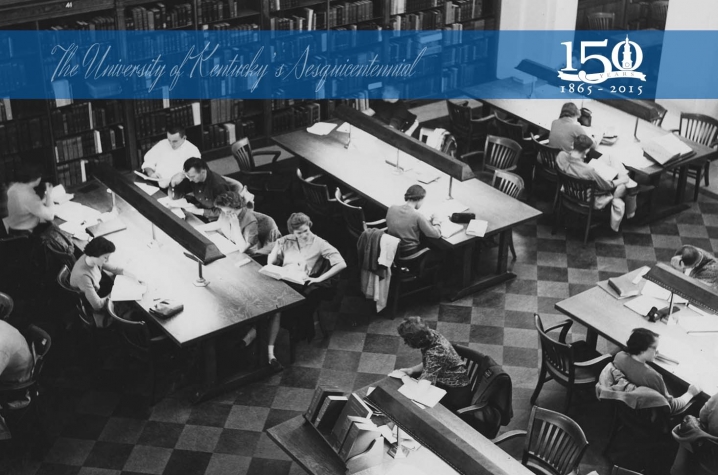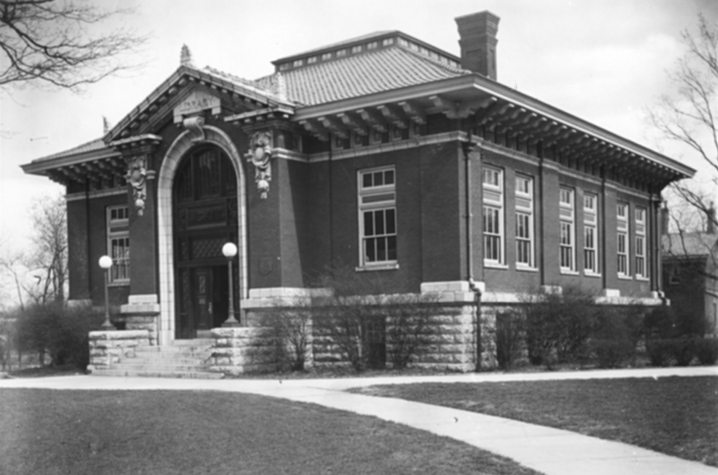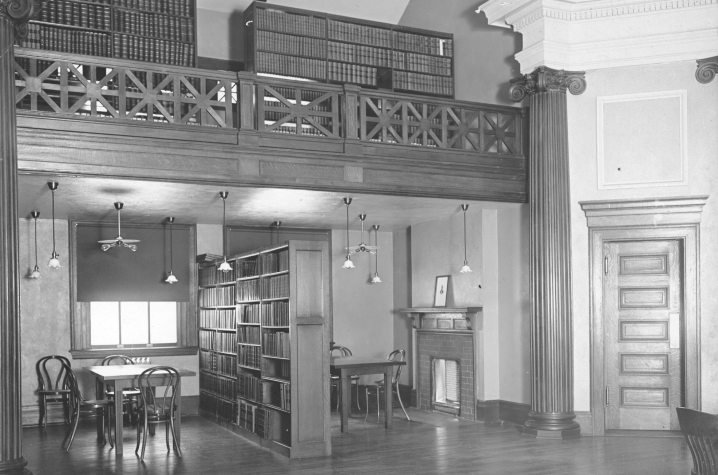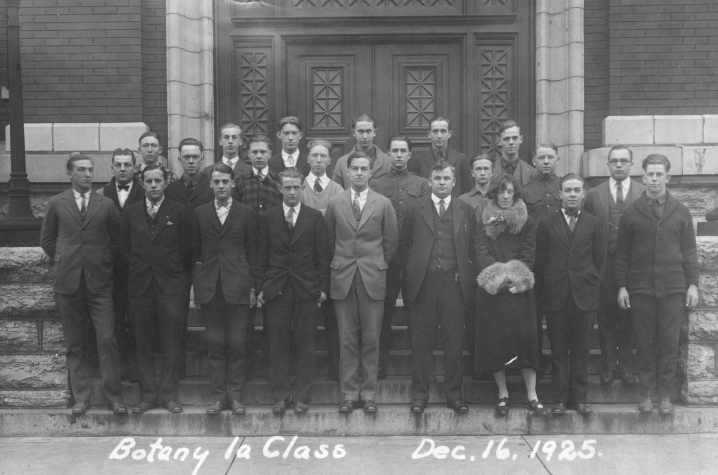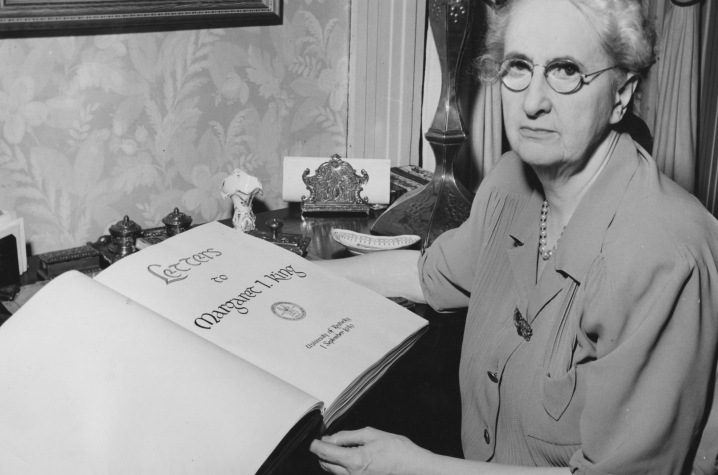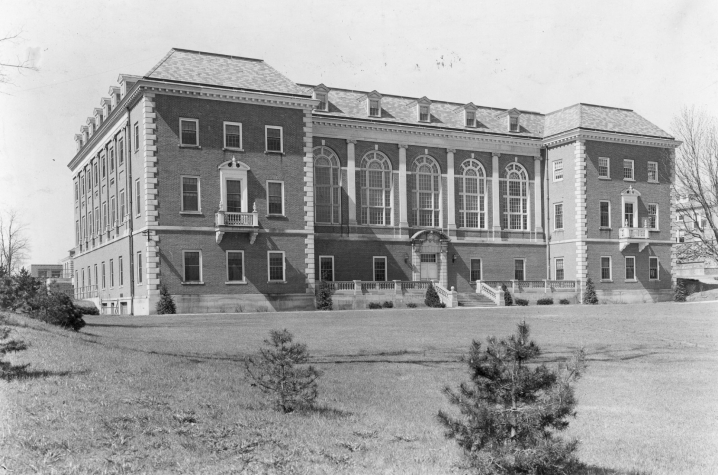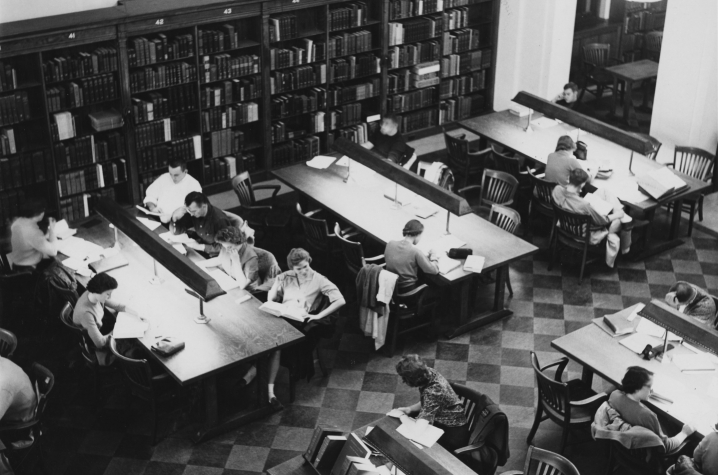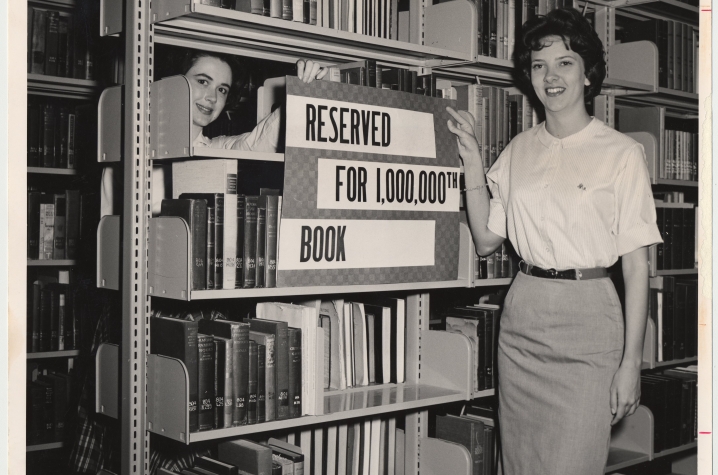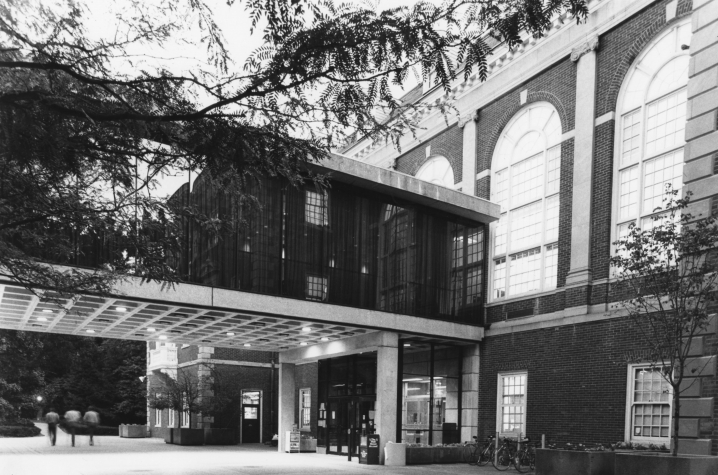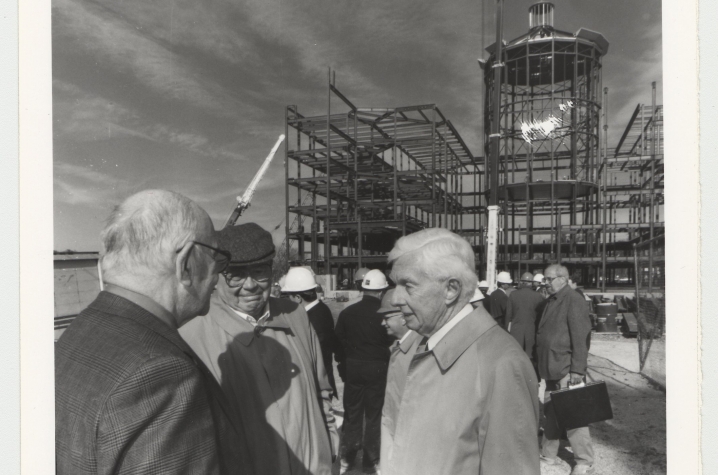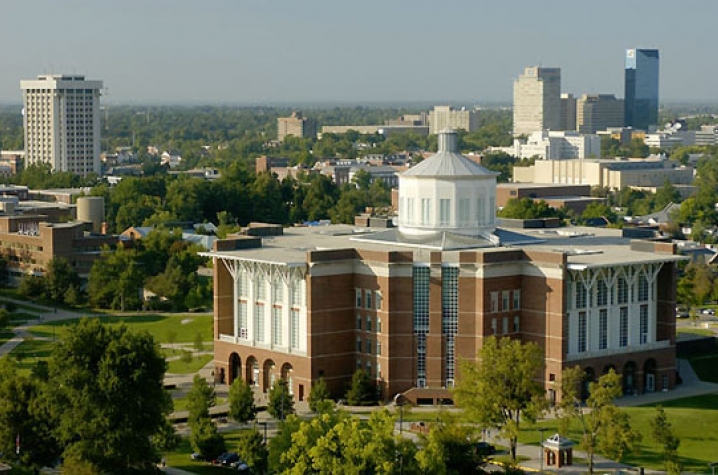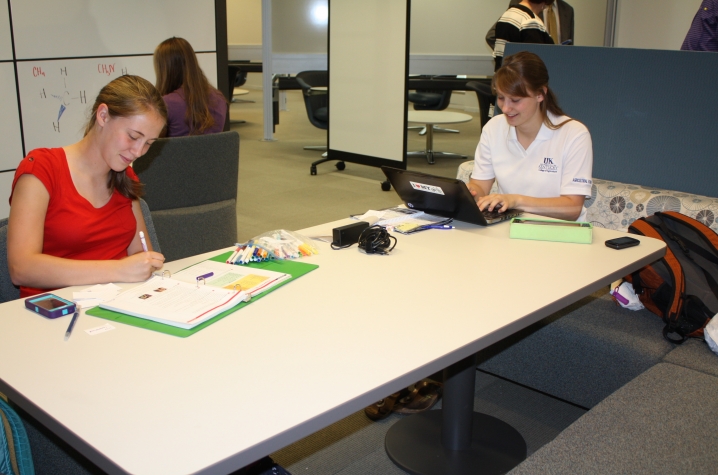UK Libraries: Embracing the Challenges of the Digital Century
LEXINGTON, Ky. (Nov. 21, 2014) — For over a century, University of Kentucky Libraries has served generations of students, faculty and researchers in the Commonwealth and worldwide. As the university approaches its 150th year, UK Libraries is enhancing its reputation as one of the nation's leading research libraries.
The university had no central library its first 44 years. UK Libraries began modestly: a small building on central campus funded by a $26,500 gift from Andrew Carnegie. The UK Board of Trustees pledged to set aside $2,650 annually for library upkeep and maintenance, and the yearly budget for books was $2,000. The Carnegie Library was dedicated on Nov. 24, 1909. The new library was only 58 feet wide by 58 feet high with a high basement used as a reading room.
President James K Patterson’s personal library was moved from the Main Building to the new library and Margaret I. King became the first librarian in 1912. The library grew to more than 3,500 volumes, and with the collection finally cataloged by 1913, students were then allowed to borrow books without first making cash deposits.
President Herman L. Donovan said that King "built the library up from one that could be housed in a single room to a library that now contains more than 400,000 volumes and is fourth or fifth in size among the libraries of the South. It would be impossible to estimate the value of her contribution to the University of Kentucky."
With a growing institution and growing responsibilities, the library system at UK had to keep pace. A new building, bearing King's name was built in 1931 with university fund reserves. That building still stands today and is home to the Special Collections Research Center and the Science Library.
By 1946, UK Libraries had established a special collection of rare books and manuscripts used by faculty and the growing number of graduate students on campus. Expanding its role in support of research, UK Libraries joined a group of the nation's leading university libraries as a charter member of the Center for Research Libraries in 1949.
In 1956 UK Libraries acquired the papers of Alben W. Barkley, former vice president of the U.S. and majority leader in the U.S. Senate. The acquisition formed the foundation for the political collection now known as the Wendell H. Ford Research Center and Public Policy Archives. The center is home to the official papers of congressional leaders, Supreme Court justices, and Kentucky governors, including those of A.B. "Happy" Chandler, who served twice as governor, as U.S. senator and as commissioner of baseball. Established as a federal depository in 1907, UK Libraries has been a Regional Depository for U.S. Government documents since 1967.
Also in 1956, UK faculty founded The King Library Press at the university. The King Library Press is devoted to the tradition of handpress fine printing established in the 15th century by Johannes Gutenberg and continuing without interruption to the present day. Founder of the press, Carolyn Reading Hammer, lived and printed with her husband, noted artist Victor Hammer, at their home on Market Street in Gratz Park prior to moving their presses to the Margaret I. King Library on the UK Campus. Through six decades, the King Library Press has employed four directors and countless apprentices, many of whom have gone forward to become accomplished printers in their own right.
In 1973, the university's internationally recognized Louie B. Nunn Center for Oral History was founded. The center is recognized around the world as a leader and innovator in the collection and preservation of oral histories. The more than 9,000 histories in the collection provide a unique look into Kentucky and American history and represent an irreplaceable resource for researchers today and for generations to come. Topics in the collection range from Appalachia, Kentucky writers, agriculture, African-American history, the history of the University of Kentucky, broadcasting, sports, Kentucky medical history, and the experience of Kentucky war veterans.
Also in 1973, Paul A. Willis became director of UK Libraries and led the institution through the transition to an online catalog. He also initiated the first development program for UK Libraries, securing both important in-kind gifts and monetary support. In 1981, one of UK's first Rhodes Scholars, W. Hugh Peal, donated his collection of rare books and manuscripts valued at $20 million dollars and then provided an endowment to ensure the growth and development of the collection. The Peal Collection is one of the world’s largest holdings of 18th and 19th century English literature, consisting of more than 2,000 books and 7,000 manuscripts.
Even after two major additions to the King Library, Willis realized that the information and learning needs of UK students could only be met by constructing a new central library. He worked tirelessly to garner funds for a new facility even as hope for state support of the project diminished. President Charles T. Wethington Jr. made a new library building one of the primary goals of his administration. He began a capital campaign for a new library using local businessman and philanthropist William T. Young’s gift of $5 million to get the campaign underway. Beginning with a goal of $20 million, the university raised $22 million from approximately 14,000 donors. The remainder of the funding was secured through bonds issued by the city of Lexington. In addition to the building campaign, the Young family was instrumental in developing one of the largest collections endowments of any public research library in the United States.
Opened in April 1998, the William T. Young Library contains 4,000 seats, numerous group study rooms, and collaborative learning spaces. Upon first visiting Young Library Dr. Mary Lynne Capilouto, spouse of UK President Eli Capilouto, described it as a "sanctuary of learning."
Video by UK Public Relations and Marketing.
In 2000, UK Libraries opened the Lucille Caudill Little Fine Arts Library and Learning Center. The Little Library was made possible, in part, by a $1 million donation from Lucille Little. The library combined collections from the Art and Music Libraries and incorporated a listening center.
Carol Pitts Diedrichs became the first dean of UK Libraries in 2003. Under her leadership, UK Libraries added its first information commons known as The Hub at WT’s and renovated and consolidated three libraries to form the Science Library.
In 2010, Terry Birdwhistell became dean of UK Libraries, which, in addition to Young Library, includes 10 physical locations: the Agricultural Information Center, the Hunter M. Adams Design Library, the Education Library, the Lucille Caudill Little Fine Arts Library, the Medical Center Library, the Science Library, the Shaver Engineering Library, and the Special Collections Research Center, as well as the Kentucky Transportation Center Library and the John A. Morris Library at the Gluck Equine Research Center.
In 2010 UK Libraries established UKnowledge, a digital collection of scholarship created by UK faculty, staff, students, departments, research centers and administration. As a strategic initiative launched by UK Libraries to support multidisciplinary collaboration, UKnowledge captures, stores, organizes and provides open and stable worldwide access to UK's intellectual capital.
Since the establishment of the UK Core curriculum, UK librarians have been actively involved with integrating library research and critical thinking skills into core courses. Librarians partner with faculty and teaching assistants to provide course guides, tutorials, in-person instruction and consultations to help students with their research.
In 2013-14, UK Libraries conducted more than 900 instruction sessions reaching more than 17,000 students. The critical thinking and research skills students develop are essential workplace and life skills that benefit UK students long after they have left the university. In addition to working with undergraduates, UK librarians frequently provide graduate students with subject specialized consultations and in-depth instruction to assist with thesis and dissertation research.
While it might seem that most of what students need is online, students and faculty still continue to visit UK Libraries and actively seek the staff's assistance. In 2013-14, UK librarians were asked more than 20,000 reference questions. In addition to the popularity of electronic resources, UK Libraries checked out more than 100,000 physical materials during that academic year.
Private funding remains essential to UK Libraries in meeting the needs of UK students and faculty. Recently, UK Libraries completed several renovations of Young Library meeting and study rooms with help from Kentucky businesses, as well as providing an updated learning space in the renovation of the facility's second floor.
Video by UK Public Relations and Marketing.
In 2012, UK Libraries welcomed the University Press of Kentucky (UPK) into its administrative organization. For nearly 70 years, UPK, in its various forms, has excelled in its goal of cultivating, publishing, and disseminating scholarship in the humanities and social sciences. While it has earned a prestigious reputation among scholars around the world, UPK also offers an invaluable service to the citizens of the Commonwealth of Kentucky.
UPK has published numerous books that have fostered understanding and appreciation of the history, politics and culture of this frequently stereotyped state and region. If not for UPK, many of these books of Kentucky and regional interest would not have been published. Outside of the region, UPK has established itself globally as a leading publisher of scholarship in a wide range of disciplines, including American history, political science, international relations, environmental studies, southern history, military history, film studies, popular culture, folklore, and Kentucky and Appalachian studies.
Today, UK Libraries is one of the nation's leading research libraries with membership in the Association of Research Libraries, the Center for Research Libraries and the Association of Southeastern Research Libraries. The library system provides access to more than 450 bibliographic databases, nearly 100,000 full-text electronic journals, and over 1 million electronic texts.
In its mission to continue to provide informational resources needed by UK students, faculty and researchers; to enhance the role of unique collections; and to provide an essential role in the capture and preservation of research data across the university, UK Libraries has several goals.
In the near future, endowments supporting the Medical Center Library must be increased to support medical education and UK Healthcare’s extensive clinical and research enterprise. The Science Library must be renovated to incorporate both Engineering and Design. An on-campus collections and data preservation center is essential to UK Libraries’ research mission. UK Libraries must become not only a vital collaborator in the university’s research enterprise, but also continue as a key partner in promotion of student success. In addition, UK Libraries intends to continue its leadership role in open access to university scholarship, access to unique research collections, and the preservation of the unique research data generated by UK faculty and students.
"Libraries have long been considered the heart of a university. The rapid transition to a digital academic and research environment has only increased the importance and value of UK Libraries to student success and the advancement of research. UK Libraries embraces the future and our central role in student success and research at the University of Kentucky," said Birdwhistell.
MEDIA CONTACT: Whitney Hale, 859-257-8716; whitney.hale@uky.edu





